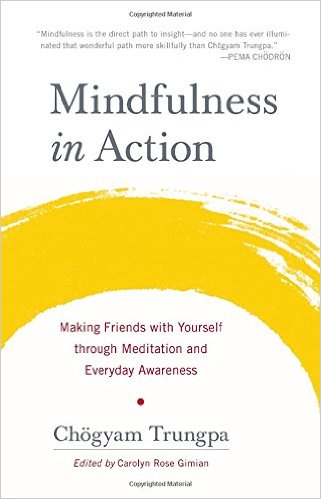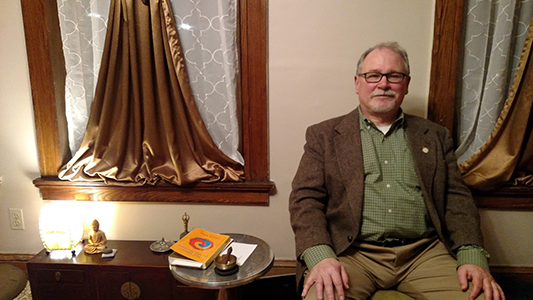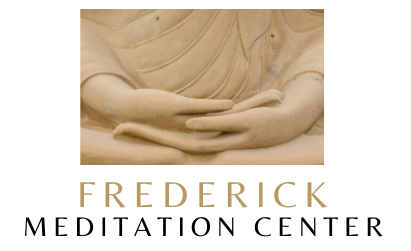Finding Contentment in Everyday Life
with Jerry Webster
Wednesday evenings, February 15th – March 8th
6:30 p.m. – 8:00 p.m. [Reserve Your Space]
 Cost: $80 for entire course
Cost: $80 for entire course
Note: As support for this course, participants may want to purchase the book Mindfulness in Action: Making Friends with Yourself Through Meditation and Everyday Awareness by Chogyam Trungpa, Shambhala Publications, which will be on sale at the Curious Iguana in downtown Frederick, MD at a 20% discount before the course begins.
The fruition of contentment is a genuine, humble, simple sense of confidence and trust. This is a genuine sense of self-respect. Because there is a sense of friendliness toward our self, we are able to rest in our experience in the present. Because we can be now, we can appreciate our self and our world. With this gentle, present, appreciation, we can meet suffering without adding further aggression to the situation. We can learn a sense of humble curiosity about moment-to moment experience.
Based upon this training in contentment in everyday life, we may have a glimpse of trusting our self. This is not just a fantasy or a hope. We can actually experience, in a basic and genuine way, that we can work with ourselves and our emotions. In this way, we can trust in our self as we are, not as we think we should be. Therefore, we experience confidence. We do not have to be afraid of who we are.
One often hears that one enters a meditation course to learn to relax, to be content. Although relaxing is often one of the byproducts of Buddhist meditation, the true purpose is to be more fully present in one’s life, being present on the spot rather than being riveted about according to one’s hopes and fears. It is about being open to whatever arises in one’s life. It is only by living in the present that one can truly live one’s life and be content with one’s life.
Meditation is making friends with oneself and developing compassion towards others. We can learn to develop friendship with our mind, skill in how to work with speed and difficulty, and a sense of humor. The journey continues by slowly allowing that mind to relax within itself. We let go of struggling with ourselves. We train in being awake in the present moment.
As human beings, our minds are naturally open, aware, fresh and good. Even though we experience agitation, difficult emotions, stress, anxiety, and anger, beneath and within all of these experiences, we can contact a state of being that is fresh and clear. Meditation is the practice to discover and rest in this uncluttered and open state of mind. Meditation is a simple practice, available to all human beings, which enables us to discover and rest in the natural peace and goodness of this world.
This is a program on finding contentment in our daily lives. It is not about becoming a Buddhist but searching into the very techniques which Gotama Buddha employed over 3,000 years ago. Well, it worked for him, and it has worked for many people since him in a variety of spiritual traditions. This is not a religious course, but it is about working with techniques that will allow one to enter one’s life more fully through the benefits of a mindfulness practice.
This program is open to both new and long-time meditation practitioners. It will allow participants to begin a new practice or to deepen one if one has already established a practice.
Meditation practice between classes is highly encouraged. It is an easy practice — just being — but as in any practice, one has to practice to learn what one is doing. We do offer cushions and chairs as seating options. Tea and water are also provided.
Course Schedule
Week 1: Introducing Contentment: Friendly to Ourselves
Week 2: Contemplating Contentment: Nowness
Week 3: Suffering and the Four Noble Truths: Meeting Suffering with Gentleness
Week 4: Working with Emotions and the Confidence of Contentment
Your Instructor
 Jerry Webster presently serves as the Shastri, or head teacher, with the Shambhala Buddhist Meditation Center in Washington, D.C. He began meditation with a ten-day retreat in India with the Burmese teacher Goenka in 1974. Since 1976, he is a student of the Shambhala Buddhist tradition, and he has taught in this tradition since 1977. He obtained his Ph.D. in Curriculum and Instruction from the University of Maryland. He has taught numerous courses in literature for the University of Maryland and numerous courses in multiculturalism for Montgomery County Public Schools. He has taught English full-time in public school systems for forty years, beginning with the Peace Corps in Afghanistan in 1973. During the past year, he has led three full-day week-long meditation weekthuns and numerous programs along the East Coast, including programs recently for Johns Hopkins University, the U.S. Peace Corps, Frederick Community College, and the Frederick Meditation Center.
Jerry Webster presently serves as the Shastri, or head teacher, with the Shambhala Buddhist Meditation Center in Washington, D.C. He began meditation with a ten-day retreat in India with the Burmese teacher Goenka in 1974. Since 1976, he is a student of the Shambhala Buddhist tradition, and he has taught in this tradition since 1977. He obtained his Ph.D. in Curriculum and Instruction from the University of Maryland. He has taught numerous courses in literature for the University of Maryland and numerous courses in multiculturalism for Montgomery County Public Schools. He has taught English full-time in public school systems for forty years, beginning with the Peace Corps in Afghanistan in 1973. During the past year, he has led three full-day week-long meditation weekthuns and numerous programs along the East Coast, including programs recently for Johns Hopkins University, the U.S. Peace Corps, Frederick Community College, and the Frederick Meditation Center.
Register now or call (240) 397-8080 to reserve your space.
